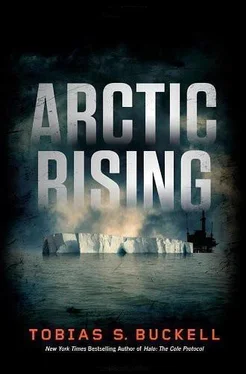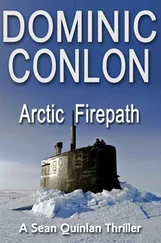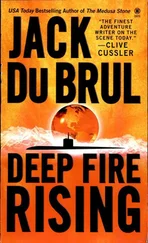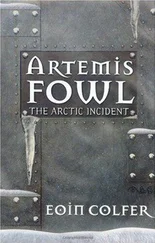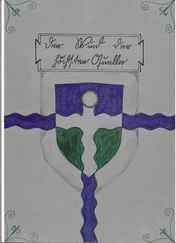High above the ferry a parafoil hung in the wind. The taught cables beneath it vibrated and sang as the kite-sail began to dance a figure-eight pattern overhead, allowing the ferry to slow down enough to meander through the debris.
Anika tried to sit up, forgetting for a second where she was. The movement sank her, and cold water washed over her face and dribbled down the sides of her cheeks. It even got inside the suit a bit, down her neck and onto her shoulders.
As the ferry picked its way through the debris of Plover, Anika waved weakly at it. “Over here!”
Someone on the deck spotted her and the ferry changed course.
An orange life preserver hit the water a few feet away. Anika clumsily paddled over to it, then pulled it on underneath her arms.
Three burly men in plaid shirts and blue coveralls hauled her out of the water and over the railing, grunting as they helped her onto the deck.
The contrast of sudden heat from the ferry cabin and the cold water she’d been pulled out of started her shivering again, her teeth pressed against each other so hard they felt like they would shatter. Her muscles spasmed, like she was having a seizure.
One of the men threw a first aid kit on the dirty metal floor in front of her.
“Come on, we gotta get this off you,” said another man behind her, yanking at the strings she’d pulled so tight.
They stripped the survival suit off her, and then someone grabbed a pair of scissors and cut her wet uniform away. Someone else wrapped a dry thermal blanket around her.
The warm air between her skin and the survival suit disappeared, and that sent her into another round of deep, bone-shaking shivering.
“Tom,” she told them, teeth chattering. “Tom.” She wasn’t sure if they could understand, and she kept repeating it as best she could.
“We’re looking for him,” someone said into her ear as they rubbed her arms.
A thermometer beeped, and Anika felt pressure against her ear release. “The shivering’s okay,” the voice behind her said. “Means you’re alive. Your temp’s a bit low, but you’re fine. Keep shivering and moving and rubbing your arms.”
Anika took an offered cup of warm water.
“Sip it,” they told her. “No gulping.”
She almost dropped the cup, but with focus and determination, she managed to bring it shakily up to her lips and sip. She hunched in place on the floor, listening to the thermal blanket crinkle and crunch every time she shifted.
“Got him!” someone shouted.
A few minutes later they dragged Tom in, dripping water, and the whole routine repeated itself. Only Tom didn’t look so good. His uniform was sopping wet; the survival suit hadn’t gotten zipped quite properly.
His lips were blue, Anika saw. Tom was almost translucent, a pale man almost tailor-built for living in this polar world. But it didn’t matter to the cold water.
A redheaded man with a long beard held up a satphone as they wrapped Tom in a thermal blanket. “UNPG’s five minutes out by helicopter. Jen? They want you to drop the parafoil.”
A short, wind-burned woman in her late fifties with a ruddy face and straw blond hair walked out into the cabin. “Five minutes? Shit. Hey! Everyone on deck, we’re pulling in the sail!”
The redhead remained bent over Tom, checking his temperature. When he sat back and glanced at Anika he didn’t have to say anything. It was in the posture. Anika saw. Tom was in bad shape.
A minute later a large amount of parachute-like material dropped to the flat back deck where the crew of the ferry grabbed it and rolled it up.
As the parafoil was being packed away, she could hear the thwap of rotor blades approaching.
Two UNPG search-and-rescue men dropped out of the sky on ropes and hit the deck. They conferred with the redhead, shouting over the noise of the hovering helicopter.
Then, consensus reached, they hauled Tom out on deck, fastened him to a basket, and all disappeared back up in the air.
“They’re low on fuel. They said they’ve been in the air since your mayday call, all the way from Nanisivik. They’ll send another helicopter for you,” the redhead said, appearing in the door.
Anika leaned back against the steel bulkhead behind her. “I understand. Does anyone have a satphone that they can lend me?”
Jen, who Anika took to be the ferry’s captain, had a thick, plastic-covered phone with a whip antenna: all functional and weatherized. The logo GAIA and a smaller TELECOMMUNICATIONS was stamped into the side in raised letters with a globe in the background. Anika slowly punched the numbers in to dial Nanisivik Base.
“Claude here,” replied a smooth, but slightly tired-sounding Québécois voice on the other side.
“Commander, it’s Anika Duncan,” she said through jaws still clenched from the cold.
“Anika! A second chopper’s about fifteen minutes out from you,” Commander Michel Claude said quickly. “Are you okay? They said you were okay. They said Tom needed to be flown back right away.”
“Yes, yes, I’m doing fine,” Anika reassured him. “They were right to leave me if they were low on fuel.” She didn’t want to be responsible for her rescuers getting themselves in danger as well due to something as simple as running out of fuel.
She could hear Michel let out a deep breath. “We have two cutters headed out at top speed for the area. We’ve put out an alert for the Kosatka . Five airplanes, two airships, and the Canadian Navy and U.S. have been updated. We’re looking over a recent satellite scan of the area. We will find and catch up to these assholes.”
“Thank you, sir. If you hear anything more about Tom, please call this number back.”
She handed the satphone back over, and Jen exchanged it for some faded blue jeans, a garish neon yellow t-shirt, and a thick, beige Carhartt jacket. “You’re about five eleven?” Jen asked.
Anika nodded. “Five ten…”
“Those’ll fit you well enough.” She shook her head. “You’re damn lucky we were out here.”
Anika pulled them on, loving the feel of warm cloth against her skin. They’d almost died. Then almost been rammed. Then frozen. She felt numb, not just physically, but mentally.
And exhausted.
But she had enough energy now to remember to ask for her uniform. She unzipped the shoulder pocket and found the backup from the scatter camera. She slipped it into her new jeans.
The ferry was on its way to Thule’s floating assemblage of old tankers, barges, and laced-together ice islands at the Pole. There they’d offload goods in the hold and workers for Gaia, Inc., a multinational company with interests in carbon mitigation. For now, though, they’d remain in place until help could get to Anika.
Fifteen minutes later she was out in the whipping cold of the rotor wash of another helicopter, into the rescue basket, and then being winched up.
As one of the chopper crew busied himself getting an IV in her arm, Anika stared out at the gray sea and the bright evening sky to the west of them.
That’s where the Kosatka was, somewhere out there over the curve of the horizon.
Another chapter of her life had just slammed shut, Anika realized, as anger gelled inside of her. A chapter of routine, calm, and knowing what each day would hold. A peaceful chapter. A good chapter.
But that was over.
Tom’s wife, Jenny, leapt up from a padded bench near a nurse’s station at the Nanisivik Hospital and grabbed Anika in a fierce hug. Her small hands gripped the back of Anika’s jacket. “Oh my God,” she said. “They said you were okay. I kept thinking, if Tom’s spent the same amount of time in the water as you, maybe they weren’t telling me everything.”
Читать дальше
